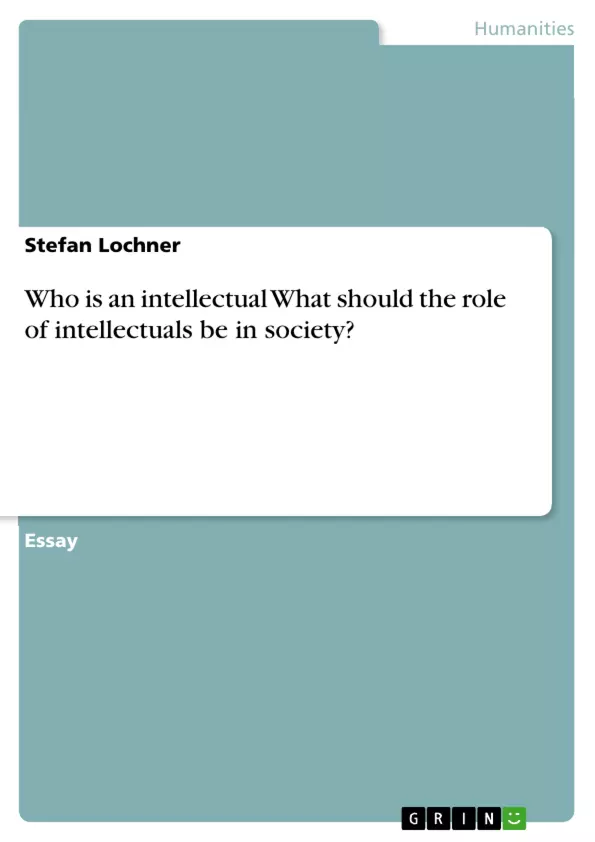It is very difficult to give a proper and precise definition of the social group or milieu of intellectuals because of its heterogenity and non-unity. Which should be the criteria and structure similarities that determine the definition? Is it possible to summarize all categories and types within a definition? Many perspectives exist concerning what an intellectual is and of course what his role or function in the society already is or should be, they all depend on different contexts or thematic fields and deviating focuses. Based on this variety I would define the explanandum according to the concept of the Weberian ideal type. In this case we should find universal categories which could stand for every object we can call “intellectual” in every time and every place, without moral, ethic or functional intentions. To my opinion intellectuals are a minority who have – due to their public/private education or natural talent – an above average expert knowledge or mind and consequently further reaching and profound realizations or specific ideas which are used to produce cultural goods in the broadest way of the word’s meaning. This includes for example scientists, authors, journalists, artists, composers, musicians, directors, priests and so on. So we have only three characteristic categories, by the may this makes them in comparison to other social groups – only in a quantitative point of view – a minority: An above average expert knowledge or mind, because of these realizations or ideas of a higher order which are finally transformed and materialized in speech, books, music, films, paintings or sculptures. Let us shortly closer light up these categories, for example in the social system of art, especially the modern art, as one subsystem of the cultural system. Some of the cultural products and with it the specific ideas, realizations and intentions have reached a point that they are for the average citizens, very difficult to understand or to interpret because of a lack of knowledge and mind in this special field. The cultural goods of the subsystem art as the so far final products of development and differentiation can therefore only in the first line really be understood by intellectuals with their special knowledge within this system that is separated from the outside.
Inhaltsverzeichnis (Table of Contents)
- Who is an intellectual? - What should the role of intellectuals be in society?
- The definition of an intellectual
- Utopias
- The role of intellectuals in post-totalitarian and democratic societies
Zielsetzung und Themenschwerpunkte (Objectives and Key Themes)
This text aims to explore the definition of an intellectual and their role in society, with a focus on post-totalitarian and democratic systems. It delves into the concept of utopia, exploring its historical evolution and distinguishing it from ideology.
- The definition of an intellectual and their role in society
- The concept of utopia and its differentiation from ideology
- The role of intellectuals in post-totalitarian societies
- The role of intellectuals in democratic societies
- The relationship between ideology and reality
Zusammenfassung der Kapitel (Chapter Summaries)
The text begins by exploring the concept of an intellectual, defining them as a minority with above-average knowledge and profound realizations who produce cultural goods. This definition is contrasted with the concept of utopia, which is defined as an ideal society that does not exist.
The text then delves into the role of intellectuals in post-totalitarian and democratic societies. It argues that there is no significant difference between the roles of intellectuals in these systems, with intellectuals having a responsibility to understand the present and critique the system.
The text concludes by discussing the impact of ideology on society and the role of intellectuals in challenging it. It argues that ideology functions as a "pseudo-reality" that provides a sense of order and identity, but also that this ideology is ultimately built on lies.
Schlüsselwörter (Keywords)
The text explores the concept of intellectuals, their role in society, and the nature of utopia. It examines the role of ideology in shaping society and the importance of critical thinking and challenge.
Frequently Asked Questions
Who is considered an intellectual according to the text?
Intellectuals are defined as a minority with above-average expert knowledge or talent who use their insights to produce cultural goods like books, art, or scientific theories.
What is the role of intellectuals in a democratic society?
Intellectuals have the responsibility to analyze the present, critique the system, and challenge ideologies that function as "pseudo-realities."
How is "utopia" distinguished from "ideology"?
A utopia is an ideal society that does not exist, while an ideology often serves as a rigid system of thought used to maintain power and provide a false sense of order.
Why are cultural products sometimes difficult for the average citizen to understand?
Due to the high level of specialization and differentiation in modern art and science, certain works require specific intellectual background knowledge to be fully interpreted.
What is the "Weberian ideal type" mentioned in the text?
It is a conceptual tool used to define "intellectuals" through universal categories without assigning moral or functional intentions to them.
- Citar trabajo
- Stefan Lochner (Autor), 2004, Who is an intellectual What should the role of intellectuals be in society?, Múnich, GRIN Verlag, https://www.grin.com/document/180622



